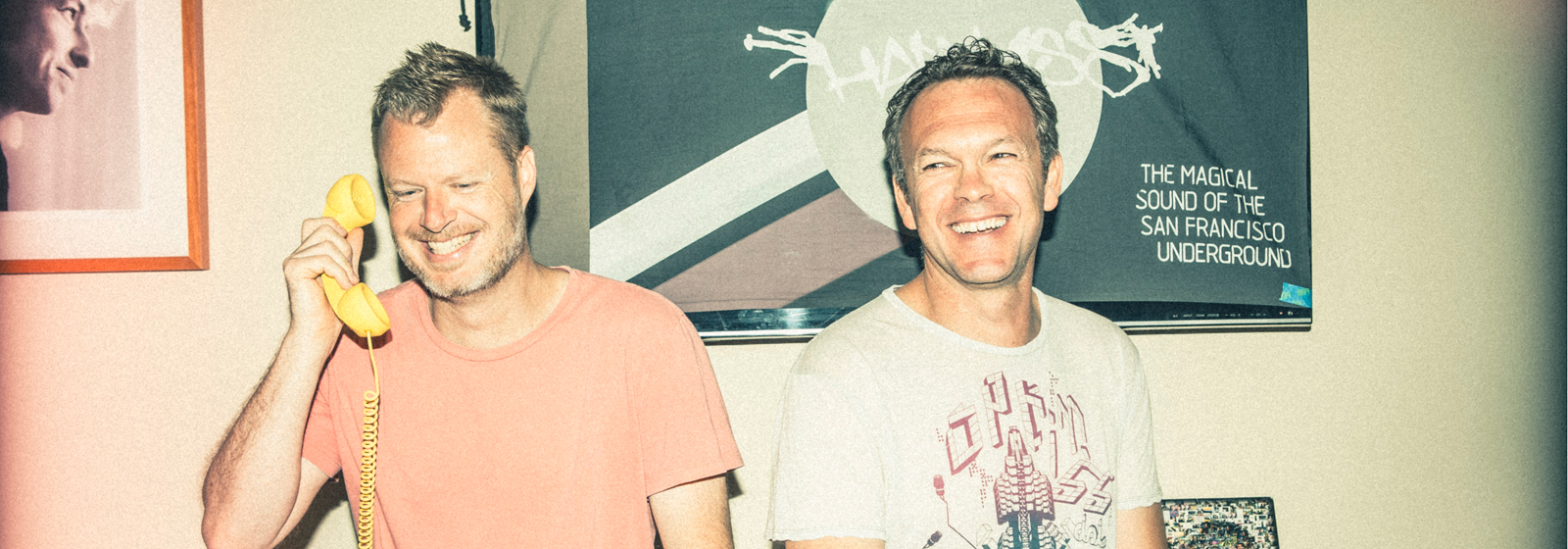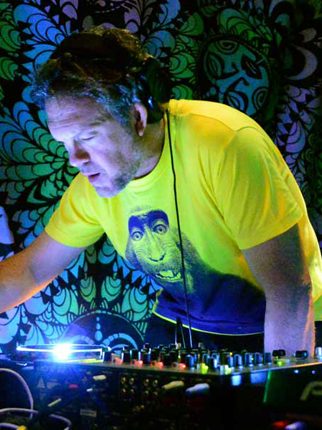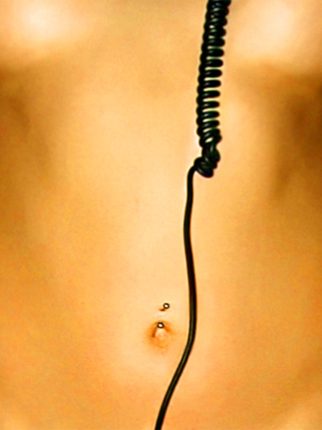Hardkiss on Hardkiss: Looping Past and Future


The Hardkiss Brothers are the original DJ band. Kicking off on the once edgy streets of San Francisco, Gavin, Robbie and Scott Hardkiss—close friends who migrated west in 1991 to help light up the rave frontier—put California’s dreamy dance beats on the international map. Their groundbreaking records, as well as their classic compilation, Delusions of Grandeur, tipped Europe to a mystic American vibe suffused with sun and moon. As DJs, Hardkiss played on beaches, in deserts and forests, in clubs and warehouses, even in abandoned churches in the South, transmitting liberation with an eclectic, positive sound.
But last year as they plotted their comeback, Scott passed away unexpectedly, leaving behind a legacy of trailblazing songs and a hole in their hearts. With support from Scott’s widow, Stephanie Diaz-Matos, Gavin and Robbie resolved to carry on, reestablishing the Hardkiss Music label and releasing a gutsy new album this past spring titled 1991, a tribute to Scott and their history. With sunny anthems like “Revolution” and “Forever Forever,” as well as soulful cloud-kissers like “Broken Hearts,” the nostalgic 1991 loops into the future with bravado.
As DJs, Hardkiss are a masterclass in taste and taking risks. Playing in Los Angeles recently to support 1991, Robbie rocked steady, heady grooves while Gavin weaved alternative magic: their own re-imagining of Change’s “Glow of Love,” Primal Scream’s “Come Together,” a brilliant re-edit of Daft Punk’s “Doing It Right,” Alex Metric’s disco psychedelia “Galaxy,” Ray Mang’s epic piano remix of Los Amigos Invisibles’ “Glad to Know You,” and Chris Malinchak’s high-sky beauty “So Good to Me.”
As Gavin says, when it comes to the best DJ sets, “the story writes itself.” No scripts. No easy ways out. Here is their conversation:
We were evangelists. A lot of people moved to San Francisco because of Hardkiss.
Double Hit Mickey and Papua New Guinea

Gavin: Hardkiss has been many things. What is Hardkiss now?
Robbie: A couple of DJs. Songwriters. It’s a story. It’s a history that involves way more than just two people. Our first trip here to L.A. from San Francisco—that was before we started Hardkiss, when your sisters were raving. We went out with them to some big rave.
Gavin: That was Double Hit Mickey.
Robbie: We hooked up with your sisters and their friends, like Laurie “Dumptruck” from UPenn. Her nickname was Dumptruck, I think because she would eat anything. We raved with her and the other girls that came to San Francisco with us, Michelle and Olivia. We were talking about what we were going to do. We were evangelists—Hardkiss evangelists. A lot of people moved to San Francisco because of Hardkiss. A lot of people made a pilgrimage. It wasn’t just us, but our records got around, and the word about Wicked’s full-moon parties and what was happening in the Bay and L.A. I know people back then from Maryland and D.C. who had gone straight to the rave scene in L.A. Daven the Madhatter’s Paw Paw Patch, we went to some of those. Then we threw our own parties. Gavin, do you remember your first DJ gig that wasn’t your own party?
Gavin: If I was going to give you the first thing that comes to mind, there was a Gathering party in San Francisco. They said I could play the side room. I think Jonah Sharp of Spacetime Continuum was also playing in the side room. It was an ambient room. Then there was me, and I just played shoegazer music.
Robbie: Do you remember any of the records you played? And would you play any of those records now?
Gavin: I know I played Galaxie 500 and Slowdive. I was coming more from indie music than electronic for that set. I have some My Bloody Valentine, Andy Weatherall remix, that I may play tonight.
Robbie: I remember at least two records that I played: “Papua New Guinea” by Future Sound of London and James Brown’s “Doing it to Death,” that starts with “Ladies and Gentlemen, there are seven known wonders of the world, you are about to witness the eighth… pass the peas! …give me some more!” I would play both of those.
Gavin: “Papua New Guinea” was one of the seminal songs of that era. It’s not really a dancefloor song, but when that would come on, if a DJ had the guts to play that song, it just opened up a whole new continuum. It was something brand new.
Robbie: Those moody breaks. Some of that Goth influence. That record became huge for us too. They couldn’t keep that record on the shelf in San Francisco. I remember how excited I was going to the record store and getting it. Who knows, I maybe had to play it that day because I had probably just got it, and was like, “Oh my god! Oh my god! I need to play it.”
I used to have to dig and dig to find extra funky stuff. But now, every kid is funky. They’re just born and raised like that.
Funky, 3-Dimensional and Vulnerable

Gavin: What do you think has changed or not changed with music since then? What are the things that you look for in today’s music?
Robbie: All these young cats have grown up where funk was completely mainstream. They have lived in a world where hip-hop was dominating radio, more or less. It’s natural to them. Whereas I used to have to dig and dig to find extra funky stuff. But now, every kid is funky. They’re just born and raised like that.
Gavin: I really like the way digital technology has progressed sonically, so you can have things sound fuller and richer. The beats almost seem ambient, and the synths are the lead, and the vocals are even bigger. You couldn’t do that back in the day.
Robbie: Not by yourself, at least. They had really expensive studios that people could make grand recordings in the ’70s and ’80s. But obviously the 3D wasn’t there, other than how you mic’d things and recorded in the room. But now you can make it sound like you have mics set up in a hundred different ways.
Gavin: But I also find that there was an emotional vulnerability back in the day that you could kind of go to on the dancefloor. Songs like “Papua New Guinea” and DJs like Scott Hardkiss could take you into a place where it touched you in a heartfelt, primal way. It’s an emotional chord. I find that’s lacking right now. It’s difficult to present that to people. They don’t want to feel vulnerable. They’ll just reach for their phones.
Robbie: Thinking back to when we first started recording music, how different was making music than how you imagined it?
Gavin: I don’t think I had imagined. It was such a faraway idea when we started making music. The first thing I got was a sampler. On Delusions of Grandeur, the “Drugs Are Dangerous” remix of the Drum Club is one of my favorite things we’ve ever done together. That session is so vivid in my memory. It was so much fun, and it just came together.
I walked down the sidewalk and saw my girlfriend—who I lived with—kissing some dude on the sidewalk… I have to crack up at how gutted I was.
Broken Hearts, Scott and Anything Goes

Robbie: Working with Scott, that childlike excitement, in the studio, that anything is possible, “Well let’s try it,” we had that total childlike “anything goes”… When we were making “Mercy, Mercy,” I walked down the sidewalk and saw my girlfriend—who I lived with—kissing some dude on the sidewalk. I was like, “Aaaaaaaaa!” You know how that is. I have to crack up at how gutted I was, what an emotional explosion that created for me that lasted a very long time. I was crying at nightclubs and stuff. It was ugly. Every time I hear that song, it takes me back. It’s such a real, connected part of me and my experience. It was called “Mercy, Mercy” right out of that. We walked back up and just finished working on it while I was in that state—which seems insane. I can’t even believe that. What was the craziest, weirdest thing that Scott talked you into or pushed you to do, metaphorically or literally?
Gavin: I mean, this whole lifestyle. Starting a record label and moving to San Francisco. Driving cross-country, going through the Badlands and into the West. We drove across this place that says “Helicopter Rides.” He’s like, “Let’s do it!” We did a U-turn, went to the helicopter pad, paid the money, and took a helicopter ride through Bryce Canyon. And we got back in the car and drove.
Robbie: He was also totally into the Rolling Stones. He wanted to be Keith Richards, but he was really Mick Jagger.
Gavin: When Scott was trying to figure out what Hardkiss was, because we were always trying to figure it out, and it was different things to us at different times, he was like, “Meet at my studio at 1pm.” And Robbie and I arrived, and he says, “All right!” He gave me a microphone, and what did he give to you, like a bass? He asked us to sing the Stones’ “Crimson and Clover”—or was it “Sympathy for the Devil”?
Robbie: I remember having those jam sessions, and I was playing bass and he was playing guitar in his place on Mission, at the loft. It was “Crimson and Clover.”
Gavin: But in a way, we are the original DJ band. Wicked is a DJ band too, but they don’t make music together as a band would. But it’s what we do. It’s a common thing now, like Swedish House Mafia. But back in the day, it was like, “What!? You’re doing that? How does that work?” Well, it works.
Robbie: “Which one of you is the rapper?”
Gavin: “Do you play any real instruments?”
Robbie: Then Scott was such a pain in the ass to work with in the studio. It was both totally fun. I miss the hell out of that. When it came down to finishing productions, he was this tortured artist, pulling out his hair [and] into the whole romance of it. It would get too heavy sometimes. He’d, like, fight you.
Gavin: The way we would get around it—three producers in a studio, like three monkeys trying to go after the same banana—is that we would have a song with three parts: the intro, the middle, the end. Now it merges a bit. We butt heads and argue with each other and convince each other of our individual aesthetics. That’s what collaboration is. Sometimes you have to compromise, but sometimes you have to go, “No, we’ve got to keep that. You don’t like it now, but you’re going to like it.” Like Scott, you have to fight for that.
Gavin and Robbie are currently touring the US. Their acclaimed album, 1991, which features contributions by the late Scott Hardkiss, is available at iTunes or on vinyl via the Hardkiss Music shop with digital download.
Photos by Catie Laffoon
You Might Also Like:
15 Essential Electronic Music Movies & Docs
The Top 10 Old-School Insomniac Rave Anthems
5 Reasons to Spend Your Halloween at Escape: All Hallows’ Eve
Exclusive gLAdiator Nocturnal Wonderland DJ Mix
Exclusive Cash Cash Nocturnal Wonderland DJ Mix



